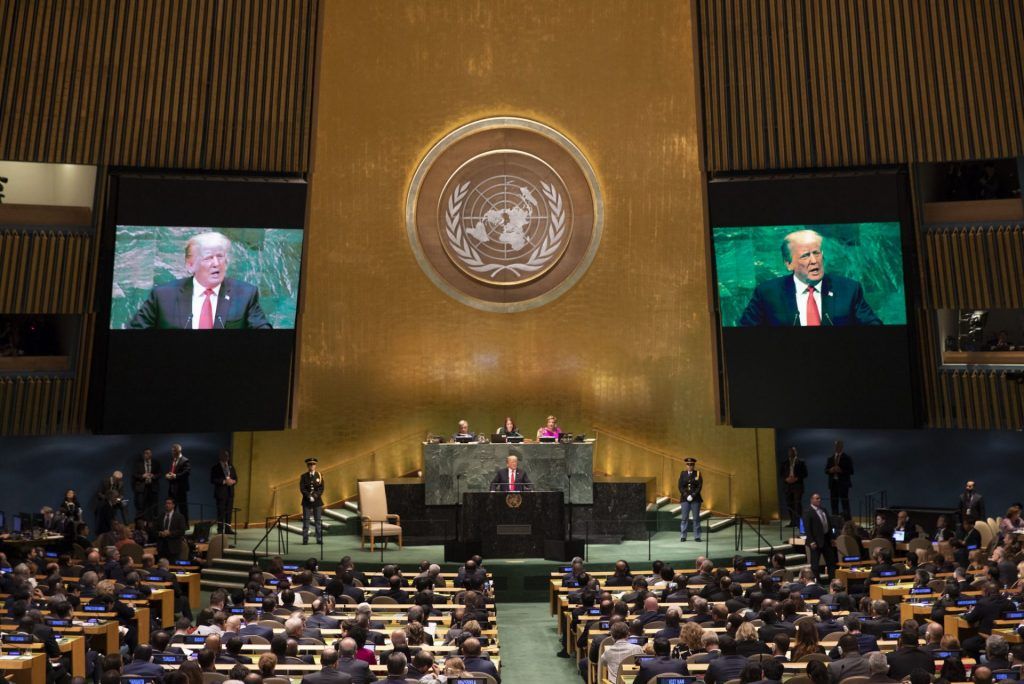In other news: climate crisis, chemical weapons, nuclear brinksmanship, etc.
By Thomas Gaulkin | September 27, 2019
 Donald Trump at the 73rd session of the UN General Assembly in September 2018. White House Photo by Joyce N. Boghosian
Donald Trump at the 73rd session of the UN General Assembly in September 2018. White House Photo by Joyce N. Boghosian
The UN General Assembly opened its 74th session this week with the usual marathon of speeches by world leaders and meetings on issues ranging from climate change to the elimination of nuclear weapons. But in case you somehow missed it, the big news capturing most of the nation’s attention this week are the revelations about Donald Trump’s potentially incriminating call with the Ukrainian president, Volodymyr Zelenskiy. Nancy Pelosi’s move to open an impeachment inquiry into the matter effectively preempted Trump’s speech to the General Assembly on Tuesday.
Given the media frenzy around these developments, you might have also missed some other stories this week from around the UN meeting that would likely be making bigger headlines if they weren’t competing with the possible upending of the American presidency. Here are just a few items worthy of your attention:
- The IPCC, a UN body, issued another report about climate change, the third in an alarming series released this year. The “Special Report on the Ocean and Cryosphere in a Changing Climate” details how rising temperatures are causing a variety of undesirable effects: sea-levels are rising at least 10 percent faster than previously thought, ocean life is being heated to death while humans reliant on seafood are becoming sicker, and extreme flooding on the coasts is becoming a once a year event instead of a once a century event. As The Atlantic reports, ”what’s clear is that climate change is going to reshape every system made of water on Earth.”
- Iran’s president Hassan Rouhani addressed the General Assembly as speculation about a possible meeting with Trump ran wild. No such luck. At a press conference on Thursday, Rouhani confirmed an IAEA report that Iran was expanding its enrichment of uranium with advanced centrifuges in light of European compliance with US sanctions, and added that he would be in favor of moving the UN headquarters from its location in New York City to “a more secure and better country that does not have the narrow viewpoints that we have been witnessing.”
- Nuclear-tinged rhetoric also heated up at the UN over the Pakistan-India conflict over Kashmir. Pakistan’s prime minister Imran Kahn warned Friday that “when a nuclear-armed country fights to the end, it will have consequences far beyond the borders. It will have consequences for the world.” He added that he wasn’t making a threat, but said India’s lifting of the curfew in Kashmir could lead to a bloodbath. “It’s a fair worry. Where are we headed?” he said, without taking the war option off the table.
- Nuclear weapons weren’t the only concern this week that missed the front page. The New York Times covered (on page 13) Secretary of State Mike Pompeo’s announcement that the US determined a May 19 attack by Bashar al-Assad’s government in northwest Syria did in fact involve chlorine gas. Speaking at a press conference in New York on Thursday, Pompeo also said that the State Department “will provide an additional $4.5 million to the Organization for the Prohibition of Chemical Weapons to help its investigations of continued chemical weapons use in Syria.”
The General Assembly speeches continue through the weekend, so there’s still time to catch a few more of the official addresses by UN member states, like Yemen, devastated by war and claiming responsibility for the oil-pipeline drone strikes that led the Pentagon to promise 200 troops and missile defense equipment to Saudi Arabia. But this year you won’t see the president of Haiti, which, too, is deep in crisis—if you haven’t heard.
Publication Name: United Nations
To read what we're reading, click here
Together, we make the world safer.
The Bulletin elevates expert voices above the noise. But as an independent nonprofit organization, our operations depend on the support of readers like you. Help us continue to deliver quality journalism that holds leaders accountable. Your support of our work at any level is important. In return, we promise our coverage will be understandable, influential, vigilant, solution-oriented, and fair-minded. Together we can make a difference.
Topics: Climate Change, Nuclear Risk, What We’re Reading














